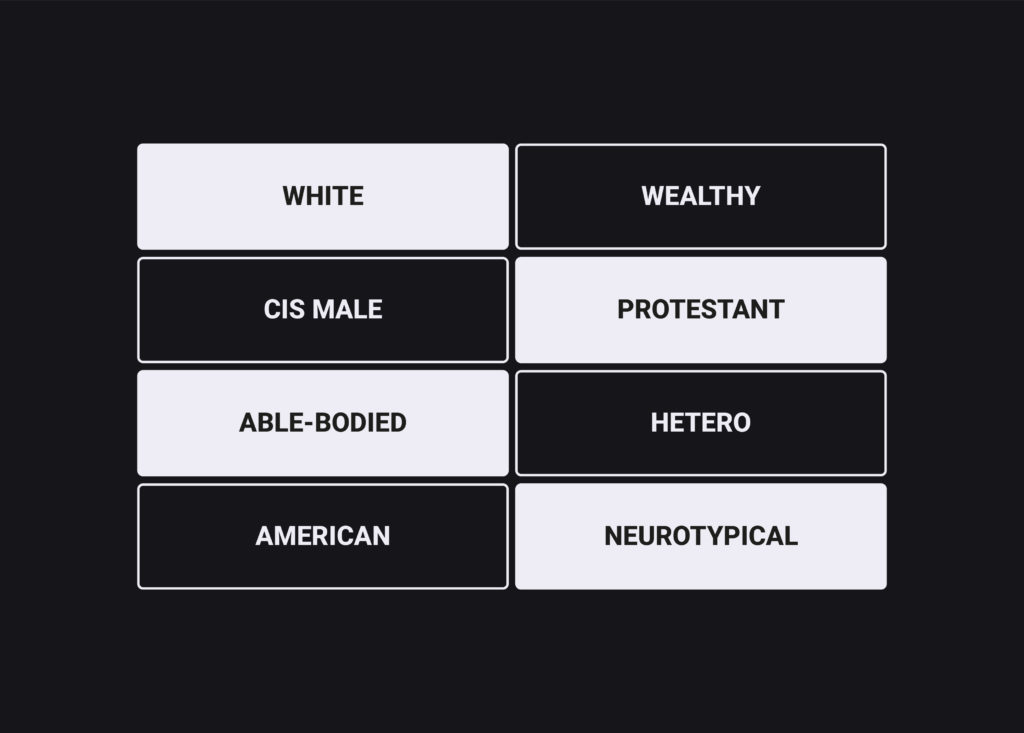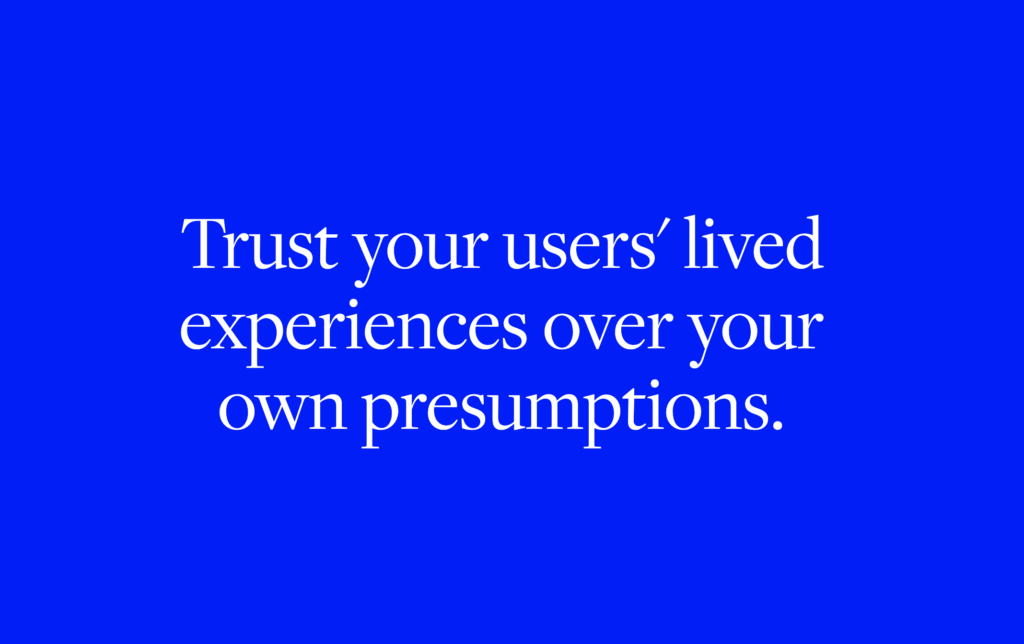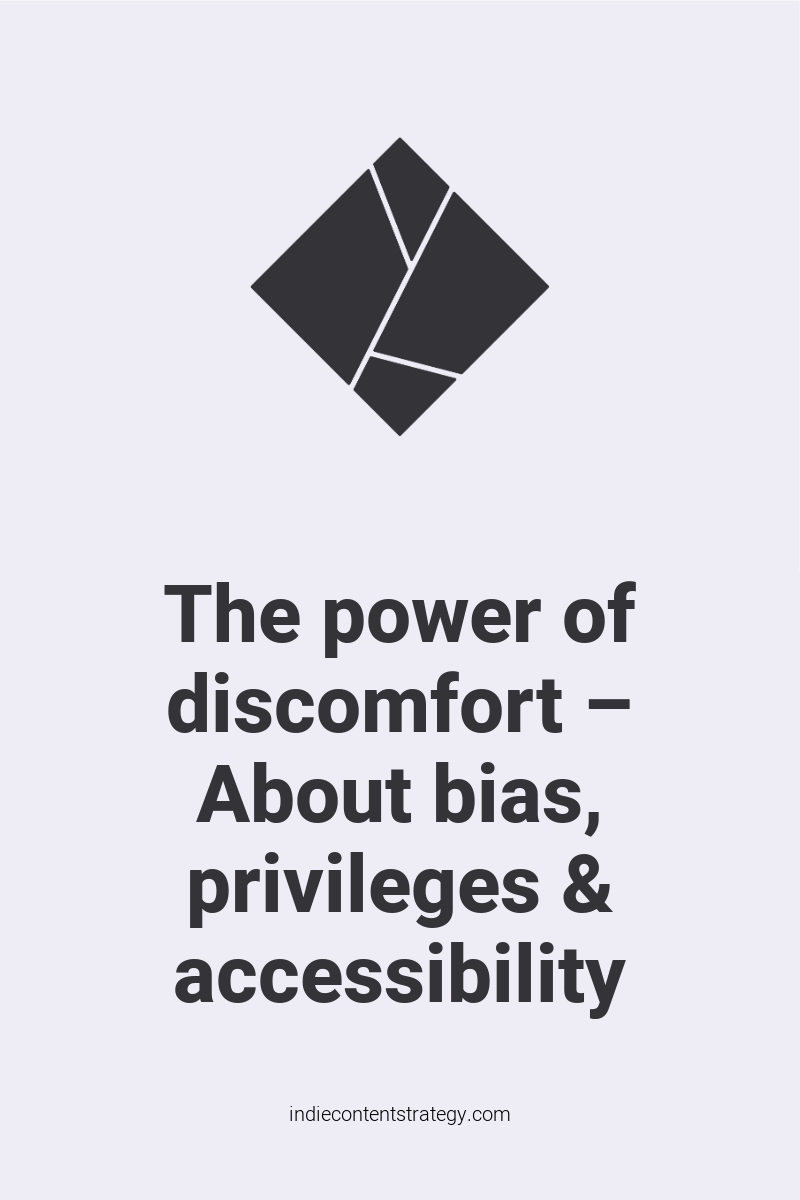Nothing can be changed until it is faced.
James Baldwin
This is a quote that Tatiana Mac used in her #Perfmatters talk 2019 How privileges define performance that centered around privilege and its impact on accessibility, tech and design.
We are all biased and privileged (but may not know it yet)
Our own privilege and bias is invisible to us, so we don’t realize the power it gives us. It literally harms people when we keep on prioritizing the experience of privileged groups when creating digital products.
Changing that goes along with the discomfort of looking inward and facing all the things that give you a head start in life.

(based on Tatiana’s concept & graphic from her talk)
Throughout my course on accessibility with Eric Eggert I felt this kind of discomfort a lot. We talked about how to make tech – and especially the web – accessible for everyone: Best practices for layout, navigability, images, audio, video, responsive design, social media and how to test if we failed.
Technically, I knew many of these things from my previous studies, some from implementing them or at least from reading about them. If I would have known nothing about those topics before, this course would have been eye-opening in a different way. But I realized how little I prioritized many things that would be ridiculously easy to fix, and it made me feel so bad.
As Tatiana emphasized, most websites fail on the most basic accessibility measures: contrast, alt text, form labels. And did anyone of you ever add alt text to the images you tweeted, or even know that it’s possible? It’s not even hard – so why don’t we all just do it?
…because we center the able-bodied and neurotypical experience!
Tatiana Mac
Our privilege defines our thinking. Well, at least now I’m aware of (some more of) my biases.
100 kinds of biased
We are influenced by cognitive biases every day. As well as our routines and habits, they influence our rational decisions (read: decisions we think are rational).
In reality, we mostly like to believe and do what the majority of people believes and does. This is called bandwagon effect, and it increases with the number of people holding a belief. Clearly, this doesn’t end well for underrepresented groups.
During my past semester we also focused on different types of bias when designing our research for our UX course with Arvid Brobeck. I kind of obsessed over them for a good while. There are definitely more that hold us back:
Conservatism bias is to blame that we’re so slow to accept new ways of doing or understanding things as an industry. We’re comfortable with the things we know, which is also a reason why it’s hard to break bad habits.
Selective perception makes us see and understand things based on our own frame of reference. It’s further fueled by confirmation bias (our inclination to only listen to information that confirms our point of view) and filter bubbles on social media.
There are literally hundreds of biases that influence what we notice, what we remember, how we act, research and draw conclusions. (Here’s a super neat infographic print classifying 188 types of bias!)
What makes it even worse is our blind-spot bias (or unassumed bias) which prevents us to recognize our own bias. My god, how do we get out of this spiral?
Our privilege is a responsibility
It’s easy (or at least easier) to see and point out injustice that happens to us or that we can relate to. I, as a woman in tech, can relate to injustice happening to other women in tech. I can cultivate my rage on Twitter, within my filter bubble.
But how could I ever fully understand how it is to navigate the world and the web blindly? I don’t really understand how frustrating it is if I can’t navigate a website because the developers couldn’t be bothered to make it accessible for me as well.

(© Tatiana Mac)
We need to learn to trust the judgement of those less privileged and accept our own privilege as a responsibility. It is not our fault that we’re privileged, and it’s not inherently a bad thing. But it does not only help us succeed, it also gives us the power to put others down, to exclude and harm them.
Discomfort drives change
Nothing can be changed until it is faced – remember? This quote reminded me of another one:
Pain travels through families until someone is ready to feel it.
Stephi Wagner
It is basically another version of the James Baldwin quote that focuses on personal relationships. It might be a bit too deep for you right now, but I think it illustrates the issue even more clearly: Until we face what may feel uncomfortable, we will pass it on. As a family, as a society, as communities. And as tech professionals as well.
You can’t do anything against being biased. We just are. But we can choose to look the right way. Or, in Tatiana’s words: Do the right fucking thing!
Sources & Reading Suggestions
- How privileges define performance – Tatiana Mac’s Slides from her @Perfmatters 2019 talk
- Technically Wrong: Sexist Apps, Biased Algorithms, and Other Threats of Toxic Tech – Sara Wachter Boettcher
- Algorithms of Oppression: How Search Engines Reinforce Racism – Safiya Umoja Noble
- Weapons of Math Destruction: How Big Data Increases Inequality and Threatens Democracy – Cathy O’Neil
- Blindspot: Hidden Biases of Good People – Mahzarin R. Banaji



